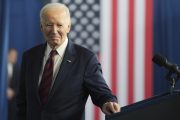
Rarely has a governor’s race had such a clear-cut focus. In Kansas, Republican Governor Sam Brownback is facing a strong challenge from Democrat Paul Davis, who is concentrating on Brownback’s tax policies, which were designed to stimulate Kansas’ moribund economy. They’re not working, says Davis, and the tax cuts passed by Brownback 20 months ago need to be repealed to save the Kansas economy and protect government services.
Davis is getting a lot of help from liberals and from moderate Republicans who were voted out of office by Tea Party activists in the last two elections. In June, the liberal Kansas City Star claimed “The state’s finances are in a huge hole that could get a lot deeper. A state that already is shortchanging its schools, underpaying its employees and running disgraceful waiting lists for disabled citizens who need services is likely to experience even more pain — unless elected officials repair the bad decisions made in the last two years.” It took great pains not only in reporting the state’s revenue shortfall through the end of May of some $310 million, the editorial also extended, by assumption, that shortfalls not only would continue but would get worse over the next few years. It concluded:
Kansas government is starving, and politicians are going to have to contemplate the unthinkable — a rollback of the draconian tax cuts that never should have been passed.
The numbers are bad and primed to get worse. No flowery campaign talk can change the dreadful mathematics.
Other critics have pointed out that Kansas has recently had its credit rating cut and that funding for education and transportation is at risk. Said Steve Morris, a member of Republicans for Kansas Values, a group of more than 100 GOP members who are backing Brownback’s opponent, “People are concerned about education. They’re concerned about transportation. They’re concerned about the direction the state’s heading in.”
According to Real Clear Politics, at the moment, Davis has a four-point lead in the race. Rasmussen shows Davis leading Brownback by 10 points.
Davis’ advantage could disappear, however, if the Kansas economy continues to improve sufficiently to negate Davis’ complaints. The Wall Street Journal came to Brownback’s defense in late July, noting, “The truth is that it’s too soon to draw grand conclusions about the tax cuts which have been in effect for all of 19 months.” The Journal noted that under Brownback’s tax reform, marginal tax rates have dropped considerably — from 6.25 percent to 4.8 percent for those earning more than $15,000 a year, and from 3.5 percent to 2.7 percent for those earning less — and that the standard deduction was increased from $4,500 to $5,500. It also noted that private job growth between January 2013 and June 2014 was significantly ahead of that in neighboring states of Nebraska, Iowa, and Oklahoma. According to the Associated General Contractors of America, Kansas recorded the fourth-highest growth in construction nationwide between March 2013 and March 2014.
Brownback’s campaign also got a boost from the report from a U.S. Bureau of Economic Analysis, which reported that, in the last quarter of 2013, Kansas GDP grew at an annual rate of 3.1 percent, more than its neighboring states of Missouri, Nebraska, and Oklahoma.
That trend has continued, according to the Kansas Department of Labor, which reported last Friday that the state’s unemployment rate has dropped from 5.4 percent to 4.9 percent compared to a year earlier, and that in August the state gained 2,400 private-sector jobs.
It’s going to be a near thing. With the midterms just six weeks away, it would be ironic if Davis were to replace Brownback in the governor’s mansion just as Brownback’s tax cuts took hold.
A graduate of Cornell University and a former investment advisor, Bob is a regular contributor to The New American magazine and blogs frequently at www.LightFromTheRight.com, primarily on economics and politics. He can be reached at [email protected].



